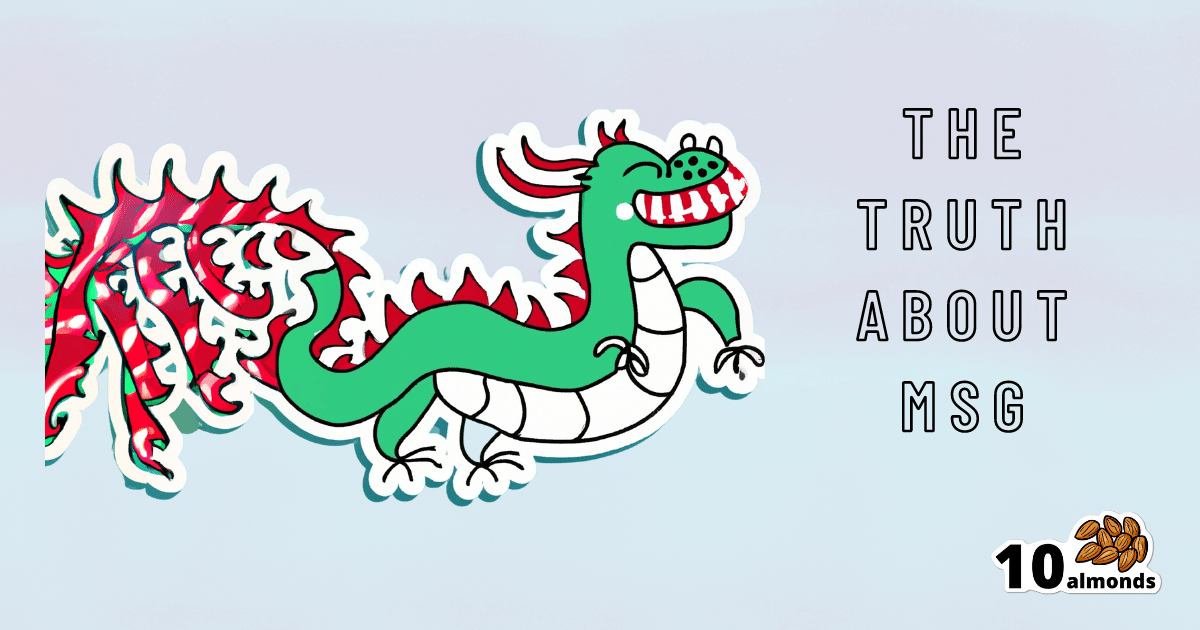What’s the deal with MSG?
Monosodium Glutamate (MSG) is not high in salt, does not trigger gluten sensitivity, and is processed by the body like any other food. The belief that it causes health risks is unfounded. Enjoy it in moderation.

Monosodium Glutamate: sinless flavor-enhancer or terrible health risk?
There are a lot of popular beliefs about MSG. Is there a grain of truth, or should we take them with a grain of salt? We’ll leap straight into myth-busting:
MSG is high in salt
True (technically) False (practically)
- MSG is a salt (a monosodium salt of L-glutamic acid), but to call it “full of salt” in practical terms is like calling coffee “full of fruit”. (Coffee beans are botanically fruit)
- It does contain sodium, though which is what the S stands for!
- We talked previously about how MSG’s sodium content is much lower than that of (table) salt. Specifically, it’s about one third of that of sodium chloride (e.g. table salt).
MSG triggers gluten sensitivity
False!
Or at least, because this kind of absolute negative is hard to prove in science, what we can say categorically is: it does not contain gluten. We understand that the similar name can cause that confusion. However:
- Gluten is a protein, found in wheat (and thus wheat-based foods).
- Glutamate is an amino acid, found in protein-rich foods.
- If you’re thinking “but proteins are made from amino acids”, yes, they are, but the foundational amino acid of gluten is glutamine, not glutamate. Different bricks → different house!
The body can’t process MSG correctly
False!
The body has glutamate receptors throughout the gut and nervous system.
The body metabolizes glutamate from MSG just the same as from any other food that contains it naturally.
Read: Update on food safety of monosodium l-glutamate (MSG) ← evidence-based safety review
MSG causes “Chinese Restaurant Syndrome”
False!
Racism causes that. It finds its origins in what was originally intended as a satirical joke, that the papers picked up and ran with, giving it that name in the 1960s. As to why it grew and persisted, that has more to do with US politics (the US has been often at odds with China for a long time) and xenophobia (people distrust immigrants, such as those who opened restaurants), including nationalistic rhetoric associating immigrants with diseases.
Read: Xenophobia in America in the Age of Coronavirus and Beyond ← academic paper that gives quite a compact yet comprehensive overview
Research science, meanwhile, has not found any such correlation, in more than 40 years of looking.
PS: we realize this item in the list is very US-centric. Apologies to our non-US subscribers. We know that this belief isn’t so much of a thing outside the US—though it certainly can crop up elsewhere sometimes, too.
Are there any health risks associated with MSG, then?
Well, as noted, it does contain sodium, albeit much less than table salt. So… do go easy on it, all the same.
Aside from that, the LD50 (a way of measuring toxicity) of MSG is 15.8g/kg, so if for example you weigh 150lb (68 kg), don’t eat 2.2lb (a kilogram) of MSG.
There have been some studies on rats (or in one case, fruit flies) that found high doses of MSG could cause heart problems and/or promote obesity. However:
- this has not been observed to be the case in humans
- those doses were really high, ranging from 1g/kg to 8g/kg. So that’d be the equivalent of our 150lb person eating it by the cupful
- it was injected (as a solution) into the rats, not ingested by them
- so don’t let someone inject you with a cup of MSG!
Read: A review of the alleged health hazards of monosodium glutamate
Bottom line on MSG and health:
Enjoy in moderation, but enjoy if you wish! MSG is just the salt form of the amino acid glutamate, which is found naturally in many foods, including shrimp, seaweed, and tomatoes.
Scientists have spent more than 40 years trying to find health risks for MSG, and will probably keep trying (which is as science should be), but for now… Everything has either come up negative, or has been the result of injecting laboratory animals with megadoses.
If you’d like to try it in your cooking as a low-sodium way to bring out the flavor of your dishes, you can order it online. Cheapest in bulk, but try it and see if you like it first!
(I’ll be real with you… I have 5 kg in the pantry myself and use about half a teaspoon a day, cooking for two)
Share This Post
Learn To Grow
Sign up for weekly gardening tips, product reviews and discounts.




